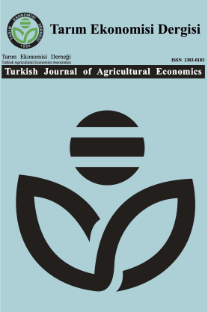Effect of Risk Attitudes on the Success of the Agricultural Enterprises and * Analysis of Affecting Factors
Tarım İşletmelernde Rsk Tutumlarının İşletme Başarısı Üzerne Etks ve Etkleyen Faktörlern Analz
___
Akcaoz, H. and Ozkan, B. (2005). Determining risk sources and strategies among farmers of contrasting risk awareness: a case study for Cukurova region of Turkey, Journal of Arid Environments, 62(4):661-675.Alderman, H. (2008). Managing risks to increase efficiency and reduce poverty, World Development Report, World Bank, Washington DC.
Berenson, M. L. and Levine, D. M. (1996). Basic business statistics: concepts and applications, Sixth Edition, Prentice-Hall International pp.837.
Boakye, A.A. (2017). Risk attitudes, risk management and business success of micro and small informal agribusiness entrepreneurs in Ghana: The Case Of Agri-Food Processors, PhD Thesis, Department of Agricultural Economics and Agribusiness, University of Ghana.
Ceyhan, V., Cinemre, H.A. and Demiryürek, K. (1997). Determination of risk behavior of farmers in Samsun Province Terme District, Ondokuz Mayıs University Agricultural Faculty Research Series No:3, Samsun. (In Turkish)
Dillon, L. J. and Scandızzo, P. L. (1978). Risk attitudes of subsistence farmers in Northeast Brazil. A Sampling Approach, American Journal of Agricultural Economics, 60 (3):425-435.
Erkuş, A., Bülbül, M., Kıral, T., Açıl, F. and Demirci, R. (1995). Agricultural economics, Lecture Book, Publication of Ankara University Agricultural Faculty Education, Research and Development Foundation, Ankara. (In Turkish)
Greene, W.H. (2003). Econometrics analysis, Pearson Education LTD. ISBN: 0-13-110849-2 New York.
Holloway, C. (1979). Decision making under uncertainty: models and choices. Prentice-Hall, Inc., Englewood Cliffs, New Jersey.
Karberg, S. (1993). Developing a sensible and successful marketing attitude. Purdue University, Cooperative Extension Service, West Lafayette, Indiana, EC-673,
Mickelsen, S. and Trede L. D. (2001). Identifying and applying learning modes to risk management education to Iowa farmers, 28th Annual National Agricultural Education Research Conference December 12, Pp: 513-525.
Ndem, C.N. and Osondu, C.K. (2018). Risk sources and management strategies among cassava farmers in Abia State, Nigeria, Scientific Papers Series Management, Economic Engineering in Agriculture and Rural Development 18(1): 267-276.
Özçomak, M.S., Oktay, E. and Özer, H. (2005). Determination of the factors affecting potential natural gas demand in Erzurum Province, 7th Natonal Econometrc and Statstcs Symposum, İstanbul University. (In Turkish)
Özdamar, K., 2002. Statistical data analysis with packet programs, Volume 1, Second Pub., Eskişehir, Kaan Publication. (In Turkish)
Paudel, B., Acharya, B.S., Ghirimire, R., Dahal, K.R. and Bista, P. (2014). Adapting agriculture to climate change and variability in Chitwan: long-term trends and farmers' perceptions, Agricultural Research, 3:165-174.
Perry, J. and Johnson, J. (2000). Influences of human capital and farm characteristics on farmers' risk attitudes producer marketing and risk management: Frontiers for the 21st Century Conference, January 13-14, Orlando, Florida, Pp: 23.
TSI, (2017). Agricultural Production Statistics. http://www.turkstat.gov.tr Ullah, R., Shivakoti, G.P. and Ali, G. (2015). Factors effecting farmers' risk attitude and risk perceptions: the case of Khyber Pakhtunkhwa, Pakistan, International Journal of Disaster Risk Reduction, 13:151-157.
Vergara, O., Patrick G. F., Knight, T. O. and Baquet, A. E. (2001). Understanding limited resource farmer's risk management decision making: summary and preliminary analysis, a report from the understanding farmer risk management decision making & educational needs research proj. Information Rep. 2001-003, M. S. University, Department of Agricultural Economics, Pp: 26.
Yamane, T. (1967). Elementary sampling theory. Prentice-Hall Inc.Englewood Cliffs, New Jersey.
Yusuf, S. and Malomo, D. (2007). Technical efficiency of poultry egg production in Ogun State: A Data Envelopment Analysis Approach. International Journal of Poultry Science, 6 (9): 622-629.
- ISSN: 1303-0183
- Yayın Aralığı: 2
- Başlangıç: 1992
- Yayıncı: Tarım Ekonomisi Dergisi
Emre TORGUT, Serdar ANNAYEV, Murşide Çağla ÖRMECİ KART, Berna TÜRKEKUL
Türkye Turunçgl İhracatının Rekabet Gücünün Analz
Gıda ve İçecek Tüketiminde Yeni Trendlerin Değerlendirilmesi
Tarım İşletmelerinde Sürdürülebilirliğin Ölçülmesi: Aydın İli Örneği
Zeki BAYRAMOĞLU, Orhan GÜNDÜZ, Zuhal KARAKAYACI
Tarım İşletmelernde Rsk Tutumlarının İşletme Başarısı Üzerne Etks ve Etkleyen Faktörlern Analz
Zeki BAYRAMOĞLU, Orhan GÜNDÜZ, Zuhal KARAKAYACI
Plastik Serada SivrBiber Üretiminin Teknik Etkinliği: Mersin İli Örneği, Türkiye
Plastik Serada Sivir Biber Üretiminin Teknik Etkinliği: Mersin İli Örneği, Türkiye
Tarım Sektöründe Ar-Ge ve İnovasyon
